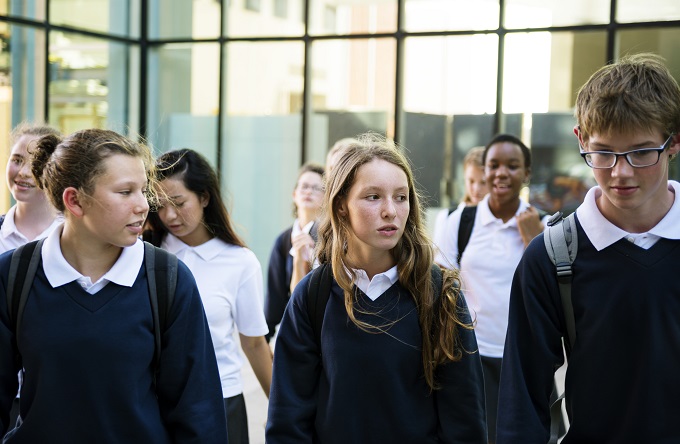
© Rawpixel.com Images - stock.adobe.com
<h2>With the expectation that by 2030, there will be an additional 60,000 schoolchildren to educate in the Auckland region, a review of enrolment zones is part of the consideration on how to cater for the growth.</h2>
<p>The Ministry of Education issued a statement saying, &#8220;While growth is happening across the country, Auckland, in particular, has been experiencing significant and sustained growth and by 2030 we expect there will be 60,000 more school-aged children in the region. To meet that demand we are building new schools and classrooms, but have also been looking at enrolment zones. Enrolment schemes and managing down out-of-zone students are the first tool we use to manage down utilisation at schools.</p>
<p class="xxmsonormal">&#8220;We have always tried to include siblings of existing students as part of the transitional arrangements* when putting in or amending an enrolment scheme. That will not change.&#8221;</p>
<p>In Auckland, around 58% of schools already have enrolment schemes. Last year, the MoE began a three-phase enrolment scheme programme for the region. Through phase one of the programme, the Ministry introduced or amended enrolment schemes at 47 schools taking effect from term one this year. It is currently finalising the enrolment schemes for six schools from phase one.</p>
<p>There are 55 schools in phase two of the Auckland enrolment scheme programme (including the six schools carried over from phase one whose enrolment scheme will take effect in term two). The Ministry is speaking with the boards of the schools involved in phase two and expect to start some community consultation by June.</p>
<blockquote>
<p>&#8220;Community consultation will likely include public meetings, school meetings, public notices through community newspapers, letters, surveys and use of the school’s own communication channels.</p>
</blockquote>
<p>&#8220;We anticipate that most of the enrolment schemes or amendments will take effect from Term 1 2022. We have not yet finalised the schools that will be involved in phase three but will be working to a similar timeframe with enrolment schemes or amendments taking effect by Term 1 2023.</p>
<p>&#8220;We are also consulting on a number of changes to the Education and Training Act**. One of the proposed changes is around the priority order of enrolments for out-of-zone learners. We are consulting on lowering the priority for siblings of former students and removing the priority for children of former students as a priority group. There is no plan to change the priority for siblings of current students.&#8221;</p>
<p>*The Education and Training Act 2020 allows for transitional provisions to be included in an enrolment scheme, to allow for siblings of current students to enrol at a school, even when their residence is no longer in the new (or amended) home zone. This reflects our aim to keep siblings together at the same school rather than having parents/caregivers with children at separate schools. </p>
<p>If it is agreed that out of zone siblings can be enrolled by right, it will take longer for the impact of the enrolment scheme to take effect. This means that we would consider supporting the transitional arrangement only where having the additional siblings means that the school is not overcrowded, and there is still space for the in-zone students.</p>
<p>**You can read more about these proposals here: <a href="https://conversation.education.govt.nz/conversations/education-and-training-amendment-bill" target="_blank" rel="noopener">Education and Training Amendment Bill (No 2)</a></p>
<h2>Current and proposed enrolment priorities</h2>
<p>The current enrolment priorities are:</p>
<ul>
<li>students accepted into a special programme*** run by the school</li>
<li>siblings of current students</li>
<li>siblings of former students</li>
<li>children of former students</li>
<li>children of board employees and board members</li>
<li>all other students.</li>
</ul>
<p>1. Option one is to keep these priorities as is.</p>
<p>2. Under option two, the enrolment priorities would be:</p>
<ul>
<li>students accepted into a special programme*** run by the school</li>
<li>siblings of current students</li>
<li>children of board employees and board members</li>
<li>siblings of former students</li>
<li>all other students.</li>
</ul>
<p>3. Under option three, the enrolment priorities would be:</p>
<ul>
<li>students accepted into a special programme*** run by the school</li>
<li>siblings of current students</li>
<li>children of board employees and board members</li>
<li>all other students.</li>
</ul>
<p>*** Special programmes for the purpose of enrolment schemes are programmes that have been approved as special programmes by the Secretary for Education and offer special education, Māori language immersion classes, or any other type of specialised education to overcome educational disadvantage.</p>

EXCLUSIVE: Teachers used to be paid two to three times more than minimum wage workers,…
After an “overwhelming” vote to reject the latest Government offer, secondary school teachers will begin…
Second-language learning should be compulsory, says a new report from a forum bringing together academics,…
A new entitlement aimed to improve access to learning support coordinators for schools with students…
Educators have raised questions about the Ministry of Education’s new secondary school subjects, set to…
Professional learning and development (PLD) for teachers needs to be higher impact for teachers and…
This website uses cookies.